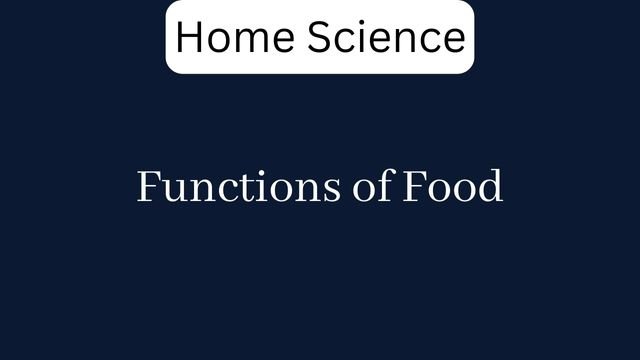Functions of Food
Functions of food:
- Air, water and food are 3 basic requirements for survival. Food, after water and air, is an essential element for a human being without which it is not possible to remain healthy and be alive for many days. A balanced diet with adequate proportion of carbohydrates, fats, protein, vitamin and mineral salts is essential for good health. Water has no nutrients yet in itself is included as a nutrient. This is because water is essential for various activities of body for life, for mainly proper balance and regulation of body temperature. Water is essential for ingestion, digestion, absorption, transportation and excretion of food. Food includes two types of food items: vegetarian food items and non-vegetarian food items. Milk, milk products, food items grown in farms such as cereals, lentils, oilseeds, green vegetables, stem-roots, fruits etc are vegetarian food items. People consuming vegetarian food items are called vegetarians. Eggs, meat, fish etc are non-vegetarian food items and people consuming these are called non-vegetarians.
- Both the types of food items affect the physical growth and development. This effect is due to the presence of nutrients in the food items. Actually the nutrients present in the food are responsible for various activities of the body.
- The nutrients present in food perform different functions. Various nutrients are — carbohydrate, fat, protein, vitamins, mineral salts and water —
1. Carbohydrate—
- Carbohydrates is the main source of energy. Fibers are also present in it in adequate quantity. These fibers help in digestive process by sending the food by synchronized contraction of stomach into small intestines where it gets digested easily. It helps in easy excretion and prevents constipation. All cereals like rice, wheat, maize, barley, millets, etc are main source of carbohydrates.
2. Protein—
- Protein is essential for body’s growth, muscle formation, repair of damaged fibers, hormone formation and blood clotting. Cells are made of proteins. Therefore, protein is essential for cell formation. Hence known as `formative element’.
3. Fat—
- Fat is a concentrated source of energy. It provides energy and calories to the body. Fat is stored in the fatty tissues under the skin and when needed (like on fasting day or while travelling or some other day when food is not available to the body) fat breaks down to provide energy to the body. One gram fat gives 9 kilo calories. Ghee, oil, groundnuts, vegetable ghee, mustard oil, other oilseeds contain fat in adequate quantities.
4. Vitamins—
- Vitamin is an organic compound which is called an essential nutrient element. It is required in small quantity but is important for body’s health. Vitamins are essential for metabolism and complex chemical reactions. They provide protection to body and give strength to fight against diseases. They work as a catalyst in the body and help in various physical activities. Therefore, consumption of vitamin-rich food is very important.
5. Mineral salts—
- Vitamins mineral salts are also important for the body. They perform two important functions—
(a) Formative functions
(b) Regulatory functions
Minerals are important for growth and development of the body as well as for formative works. Various activities of the body are regulated by mineral salts. Some mineral salts are required in large quantities while others in small quantities. Minerals required in small quantities are called ‘trace elements’. Though these are required in very small quantities yet these elements are very important for the body.
6. Water—
- After air, water is the fundamental requirement for a human being. Water works as a solvent and is important for various activities of body. 65% of our body is made up of water. Generally water is present in all food items.
Home Science Latest Post :- Click Here
Important Points of Interrelationship Between Nutrition , Food and Health :-
- As much as oxygen is important for survival likewise water and food are indispensable for living.
- Food is any solid or liquid substance consumed, digested, assimilated to provide nutritional support.
- Nutrient is a substance that provides nourishment essential for the maintenance of life and for growth.
- Nutritional status is the condition of the body in those respects influenced by the diet; the levels of nutrients in the body and the ability of those levels to maintain normal metabolic integrity. There can be two situations of nutritional status— Nutrition and Malnutrition.
- A good health includes 4 aspects: physical, mental, social and spiritual health.
- A healthy person is one whose weight and height is in accordance with his age and gender, he is a sociable person, a firm believer and possesses a well-built body, sharp mind, attractive personality.
- There is an inter-relationship between food and health. If a person consumes nutrient-rich food, his nutritional status and health always remain good.
Interrelationship Between Nutrition , Food and Health Questions and Answers :-
(i) The main source of energy is:-
(a) Carbohydrates
(b) Protein
(c) Vitamin
(d) Water
Click to show/hide
Answer :- A
(ii) Which of the following is not a physical function of food—
(a) Energy providing
(b) Growth and development
(c) Providing peace
(d) Protective and regulatory functions
Click to show/hide
Answer :- C
3. Which of the following is formative element?
(a) Carbohydrates
(b) Protein
(c) Water
(d) Fat
Click to show/hide
Answer :- B
(iv) What % of water is present in human body?
(a) 65%
(b) 67%
(c) 63%
(d) 64%
Click to show/hide
Answer :- A
